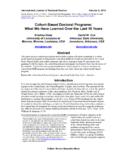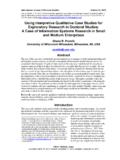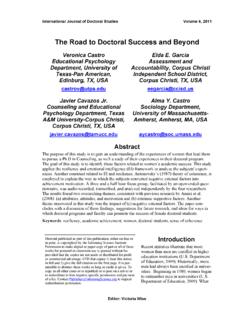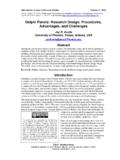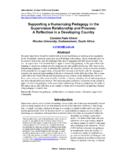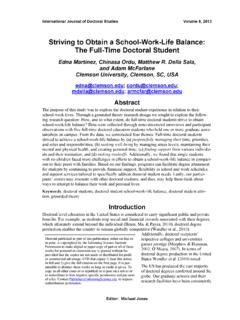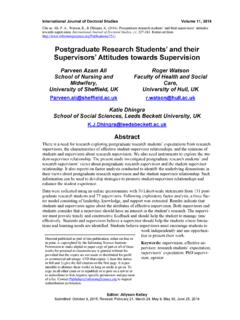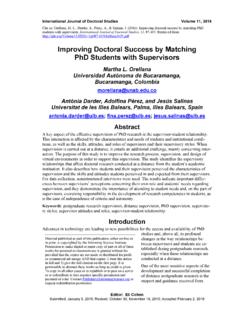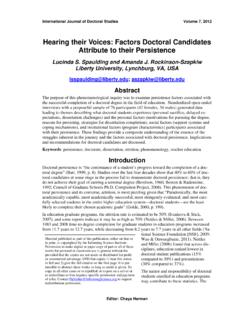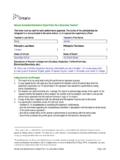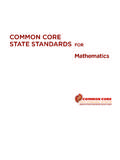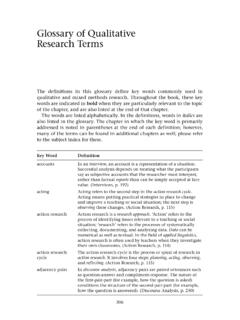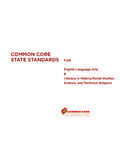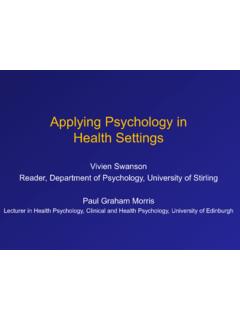Transcription of The Interpretivist and the Learner
1 Volume 13, 2018. THE Interpretivist AND THE Learner . Bonnie Amelia Dean University of Wollongong, Wollongong, Australia ABSTRACT. Aim/Purpose In the time that we study for our dissertation, our learning takes many turns. Sometimes we feel excited, motivated and accomplished, while other times frus- trated, tired or unsure. This paper presents a poem to illustrate one student's PhD. journey through reflection on those fluctuations, milestones and learning mo- ments experienced along the way. Background Central to the journey presented here is learning about the Interpretivist para- digm, its approaches, methods and critics. Interpretivism is a qualitative research approach which, in many disciplines, continues to be the positivist's poor cousin. Methodology This original paper takes an autoethnographic approach, expressed through poet- ry. Autoethnography uses self-reflection to connect personal experience to wider social and cultural understandings and has been seldom applied to investigate and uncover the contested and emergent doctoral experience.
2 Contribution Little opportunities arise during doctoral studies for the student to pause, reflect and communicate new learnings or knowledge without the boundaries of aca- demic discursive conventions. In this way, the poetic medium of expression offers an original contribution to the field. The poem also illuminates the struggles with finding voice, an ontology that resonates, and the place that marks independence from others in becoming a researcher. Findings Poetry affords ideas and feelings intensity through a distinctive style and rhythm of literature. This original poem offers a creative artefact that can be useful for supervisors and students at any stage of their dissertation, to ignite conversation on the challenges of higher education study. Recommendations This paper invites others to consider their learning journey and discovery of self, for Practitioners to reflect on and record the milestones, tensions and catalysts of learning. Recommendation It opens doors particularly for those exploring, or wanting to explore, qualitative for Researchers research through an Interpretivist paradigm where knowledge is socially or experi- entially co-constructed and the researcher is inseparable to the research.
3 Accepted by Editor Michael Jones Received: March 3, 2017 Revised: September 25, October 29, December 14, 2017 Accepted: January 19, 2018. Cite as: Dean, B. A. (2018). The Interpretivist and the Learner . International Journal of Doctoral Studies, 13, 1-8. (CC BY-NC ) This article is licensed to you under a Creative Commons Attribution-NonCommercial International License. When you copy and redistribute this paper in full or in part, you need to provide proper attribution to it to ensure that others can later locate this work (and to ensure that others do not accuse you of plagiarism). You may (and we encour- age you to) adapt, remix, transform, and build upon the material for any non-commercial purposes. This license does not permit you to use this material for commercial purposes. The Interpretivist and the Learner Impact on Society Becoming a researcher as synonymous with being a Learner is a crucial discovery that widely connects to being a practitioner in any field. Learning to love the red pen is a metaphor of doctoral studies used to denote acceptance of feedback on written work as well as acceptance more broadly that there is always more to learn.
4 Future Research What if we encouraged doctoral students and academics to challenge convention and write/produce/create authentic expressions of learning? Encouragement should be afforded to doctoral students and academics to reflect during and be- yond their research journeys, in a medium that personally resonates to empower deeper insights and understandings. Keywords autoethnography, Interpretivist paradigm, learning, poetry INTRODUCTION. After one of my first meetings with my supervisors, as a newly inducted doctoral student, I went away and drew what I wanted my PhD journey to look like. On the first page of what would be the first of five note books, I drew a graph. The graph had two axes: the vertical axis was the degree to which this would be an enjoyable experience while the horizontal axis was duration. I drew a straight line, from left to right, high up on the enjoyment' axis. I have always loved learning. I'm intrigued by new ideas, discovering patterns, trying new things.
5 It felt natural to continue studying past the bachelor degrees. I wasn't yet done with formal education. However, it was during my honours year that dissonance started to churn inside. See, I was being taught that how to research' was analogous with statistical significance, regression analysis, analysis of variance models, and statistical packages, when what I really wanted to know was individual's thoughts on volunteerism. I began my PhD several years later in a different field, looking at the learning practices of interns on placement. Having designed and coordinated an internship program for business students, I became interested in what was happening over there' in the work environment. I needed an approach that enabled access to this other world', that would allow me to step outside the higher education system and discover alongside the interns. And so began my reading into literature on the Interpretive Turn. In the opening reflections of her book chapter, Yanow (2006) describes the tensions she experienced between prevailing rational-technical theories in her discipline and her own lived experience.
6 For Yanow, like myself, these tensions led to a dissatisfaction with certain methodologies and methods that neglect a researcher's a priori knowledge and studiedness in context. These personal uncertain- ties were exacerbated when, early on in my candidature, my interpretive approach was publicly ques- tioned during a PhD faculty seminar by a professor in the finance discipline. It was here that I turned to poetry. Not on purpose. I thought it would be useful to spend time most mornings free writing, to get these questions, conflicts and ideas recorded on paper and perhaps one day look back to say wow, look how far I've come'. Somehow, this free writing emerged poetically, finding rhythm, feeling like I had an audience to write for, feeling like perhaps this struggle with iden- tity was not the first in academic history. I'm an accidental poet. And it has been transformative. Lit- tle room is made during the course of writing 80,000 words for doctoral students to practice writing any other way.
7 Poetry however, and free writing, has no boundaries, needn't have an audience, and I. can say, is an incredible beneficial reflective practice. Perhaps the graph I had drawn those years go was not realistic. There were low points. But the slow emergence of new knowledge, about the field, about research and about myself, created exceptional high points that make the low points seem brief. Our journeys will be different. The research journey I want to share with you in this paper and through the poem presented, is an amalgamation of the 2. Dean process and poetry I wrote in grappling with and discovering myself as The Interpretivist and The Learn- er. Interpretivist PARADIGM. understanding interpretivism is not as straightforward as understanding what it isn't. Interpretivism is often placed in dichotomy with positivist approaches such as hard sciences versus social sciences, numbers versus discourse, generalisability versus situatedness. Perhaps this understanding emerged during the paradigm wars of the 1980s (Denzin & Lincoln, 2011), where a move to reject positivist, quantitative research approaches was led by post-positivists/constructivists to promote a more natu- ralistic yet equally valid scientific inquiry in empirical social sciences.
8 The Interpretive Turn was coined to demark research practices that turn away from de-humanised, objective research towards a re- humanized, contextual and reflexive approach, which centralises human meaning making and knowledge claims (Yanow & Schwartz-Shea, 2014). The Interpretivist paradigm can often be found conflated with terms such as post-positivism, qualita- tive inquiry, naturalistic paradigm, qualitative research and constructivism. It has been described as an umbrella term subsuming several different schools of thought, including phenomenology, hermeneu- tics, critical theory, symbolic interaction and ethnomethodology, as well as featuring ideas that align with late nineteenth- to early twentieth-century pragmatism and later twentieth-century feminist the- ories (Yanow, 2006). Given this broad categorisation, it can be confusing when positivists and post- positivists alike continue argue over these paradigms commensurability. Lincoln, Lynham, and Guba (2011), for example, argue that at the paradigmatic or philosophical level, positivists and interpre- tivists (constuctivists) hold contrasting worldviews but methodological strategies can overlap, only to later claim in the same paper that the paradigmatic boundaries can be blurred.
9 So what can we understand to be an Interpretivist paradigm? Yanow (2006) suggests this understand- ing lies at the philosophical level with a researcher's worldview. Ontologically, selecting a paradigmatic camp is replete with underlying assumptions about reality (Hathaway, 1995). Does the researcher be- lieve there is one objective real world, or do they view the world as social constructed? While positiv- ists uphold that there is one reality, interpretivists believe reality is subjective, multiple and socially constructed (Guba & Lincoln, 1994; Krauss, 2005; Lincoln, Lynham, & Guba, 2011). Epistemologi- cally, questions on the knowability' of the subject or phenomena of study, positivists look for causes and effects, measuring and quantifying phenomena (Flick, 1998), while interpretivists believe that data cannot be collected or removed from context and as such promote the generation', discovery'. or construction' of knowledge (Denzin & Lincoln, 2011; Yanow, 2014). Methodologically, many pos- itivists adopt quantitative methods to make generalisability claims, whereas interpretivists draw on a range of methods, tools and techniques to secure an in-depth understanding of the phenomenon under investigation (Denizin & Lincoln, 2011).
10 The unique entanglement of the researcher, with their research and the researched, is central to an Interpretivist 's reflexive research practice (Yanow, 2006). However, an interpretive worldview has its critics. Critical theorists, for example, have criticised in- terpretivism for an excessive preoccupation of self a kind of naval-gazing' (Yanow, 2006) that ig- nores the impacts on individuals and their power. Questions over the quality of the mixed methods approach to gathering data arise given a lack of universal evaluative criteria to judge its merits (Schwartz-Shea, 2006). Not always holding a concrete hypothesis prior to field work, the size of some small n' studies, and the lack of generalisability and objectivity are also issues raised against Interpretivist research (Yanow, 2014). These critiques and concerns, however, are a matter of philo- sophical differences. Interpretivists over time have developed trustworthy and quality research prac- tices that counter these arguments (Yanow & Schwartz-Shea, 2014).
